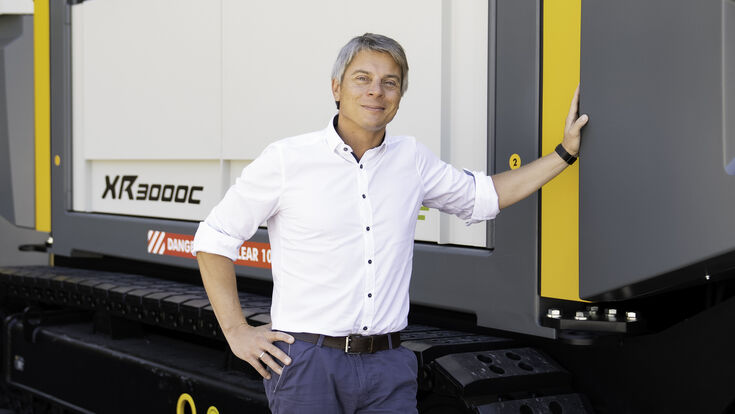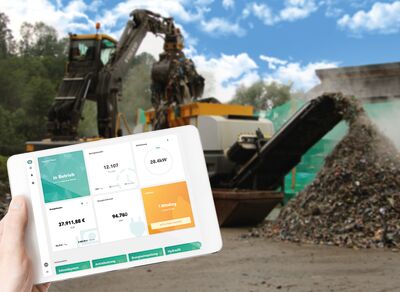UNTHA's Stefan Scheiflinger-Ehrenwerth : “Average is boring”

You recently joined UNTHA as Chief Innovation Officer (CIO). Please tell us a bit about your background and what led you to join this company.
I have been working in the waste management industry for more than 15 years. I started with wastewater and have worked my way up, above ground, so to speak. I’ve been in the recycling business for almost ten years now.
It's important for me to keep learning. I want to study something new every ten years. And so far, I've always managed to do that. I originally trained as an electrical engineer and then studied innovation management and later industrial engineering and management.
How do you see your new role and what do you bring to the company?
To create the role of Chief Innovation Officer, to lift this topic to the C-level, is a clear commitment by UNTHA to innovation. I see my role as building a culture of innovation within the company.
Technicians usually work on their ideas alone within the technical departments. When they are 100 percent satisfied, they then share them. I want to change that. I am convinced that an idea is all the better when it is shared and developed together.
I feel like innovation in the waste management industry in general has been a bit slow in recent years. Every company has its technology, which is good and works, and they keep improving it. But we haven’t seen a real leap in years. What I’ve been doing in my first few months at UNTHA is to break up existing structures, encourage people to think outside the box, and foster collaboration across departments.
A good culture of error is just as important. I want us to try new things. Maybe they work, maybe they don’t ‒ but you always learn something. I’m happy that, so far, the response within the team has been very positive.
What is the next step?
We gave innovation a building of its own – the UNTHA Technology Innovation Center, which was opened in 2024 in Kuchl, near Salzburg. Around fifteen of our experts from different departments work there now. There are not only offices but also workshops, and mini-production and assembly halls. We can build prototypes there and test them right away.
How do you identify and prioritize customer needs when developing new products?
In my experience, you can do market research, which is important up to a certain stage, but if you want to make everyone happy, you'll end up with an average product. And average is boring.
Our Technology Innovation Center includes a so-called open innovation space, directly in the middle of our prototyping area. That means we are not only bringing in our own technicians and engineers but also sharing our ideas with customers as well as industry leaders early on to get their feedback. Because in the end, they are the ones using the technology. I also want service technicians to come and go there freely. They can see on-site what works, what doesn't, and what customers need. It is important that they share their knowledge with the engineers. The exchange of information enriches it.
In my experience, you can do market research, which is important up to a certain stage, but if you want to make everyone happy, you'll end up with an average product. And average is boring.
What trends do you foresee impacting the waste management industry in the next 5 to 10 years?
The shortage of skilled labor will continue to be an issue. Manufacturers need to find solutions for this, i.e., machines that require less skilled labor to produce, operate, and maintain. The importance of machine self-learning capabilities will also take center stage. The enormous capabilities of AI technology, which is improving almost daily, will certainly play a role in our industry, which could be a big opportunity for the waste industry.
The waste management industry has come a long way. From simply reducing the volume of waste to turning waste into value. I see a zero-waste future. Not that we no longer produce any more waste, but that everything can either be reused, recycled, used as a secondary raw material or as a specific alternative fuel, starting from a single point of entry – i.e., collected in one ’bin.’ The selection point, where to decide what to do with the waste, could be at the entrance gate of a smart self-deciding waste processing plant. The technology and sensors for this already exist and will improve as quickly as AI does.
It is our aim to find good, smart solutions in machinery automation to achieve this. Ideally by cooperating with others from the industry and along the value chain.
Where do you see UNTHA's strengths?
I could argue that UNTHA machines are solid, reliable, and modular. Which is true. But what really stands out in my opinion is our future-oriented thinking. An example of this is that the company started collecting data already many years ago with the help of our digital assistant system – UNTHA GENIUS. Back then, hardly any customers wanted to spend money on this additional technology. UNTHA decided to go for it anyway and invested significantly. This is now paying off. We can access incredible amounts of data to improve our products and as a base for innovative new products and as a feedstock for the AI algorithm.
In cooperation with UNTHA



